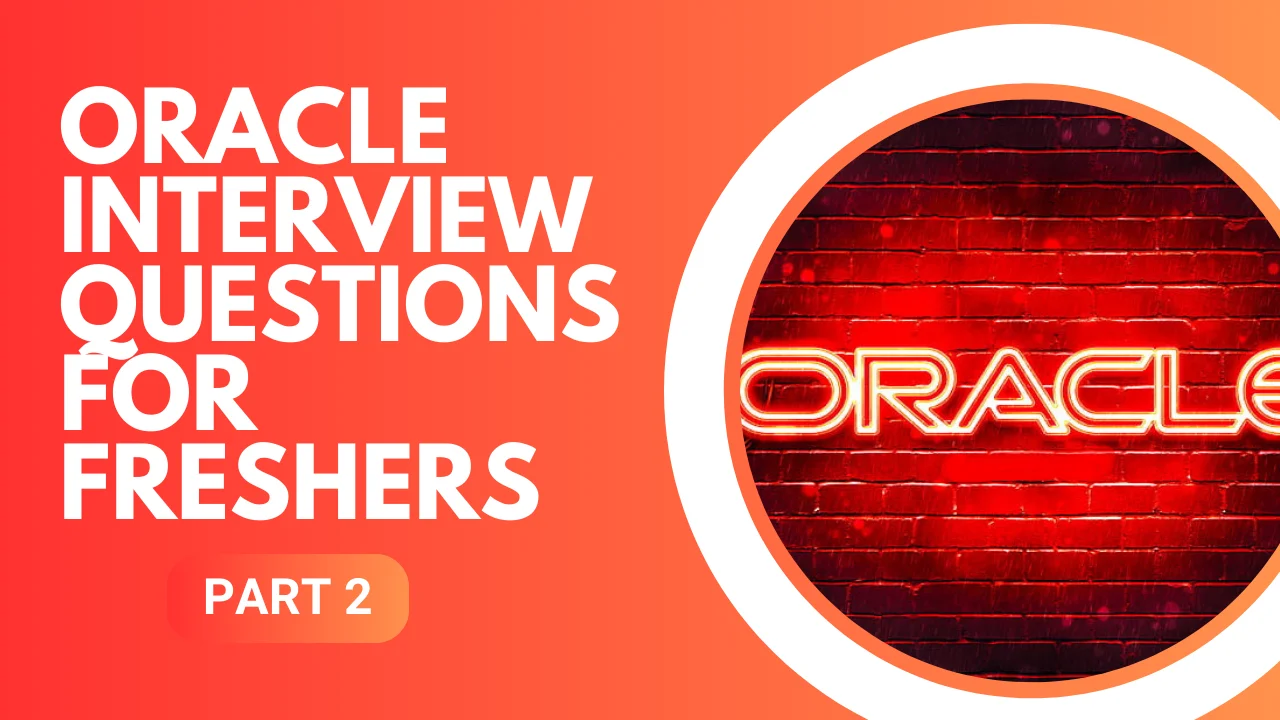Oracle Interview Questions for Freshers Part - 2

12. What is DML?
DML stands for Data Manipulation Language, a subset of SQL used to manage data within the database. It includes commands like INSERT, UPDATE, DELETE, and MERGE to modify or retrieve data.
13. What are Aggregate functions in Oracle?
Aggregate functions in Oracle, such as SUM, AVG, COUNT, MAX, and MIN, perform calculations on a set of values and return a single value summarizing the data.
14. What are Temporal data types?
Temporal data types in Oracle are used to store date and time information. Examples include DATE for storing date and time, TIMESTAMP for precise date and time, and INTERVAL for a period of time.
15. What is a View?
A view in Oracle is a virtual table created by a query. It doesn’t store data itself but provides a way to present data stored in other tables or views in a predefined format, simplifying complex queries.
16. How are pictures stored in a database?
Pictures can be stored in a database using BLOB (Binary Large Object) data type columns, which can hold binary data like images, allowing them to be stored and retrieved from the database.
17. Where do you use DECODE and CASE statements?
DECODE and CASE statements in Oracle are used for conditional processing. DECODE is used to perform simple conditional comparisons, while CASE is more versatile, handling complex conditional logic within SQL statements.
18. In Oracle, what is the purpose of the MERGE statement, and what steps are involved in merging two tables?
The MERGE statement in Oracle combines INSERT, UPDATE, and DELETE operations based on a specified condition. It’s used to synchronize data between two tables based on matching criteria.
19. What is the NULL value in Oracle?
In Oracle, NULL represents the absence of a value in a database column. It signifies that the data value for that particular column is unknown, undefined, or not applicable.
20. When is a SYSTEM tablespace created?
The SYSTEM tablespace in Oracle is automatically created when a new database is created. It contains metadata essential for the functioning of the database and stores the data dictionary tables and other system-related information.
21. Within the Oracle version numbering system (e.g., 9.3.0.5.0), what does each number signify?
The Oracle version numbering system follows the format major.release.update.patch.port_platform. Each number indicates different levels of software versioning: major release, update within the release, patch set, port-specific updates, and platform-specific updates.
22. What is a bulk copy in Oracle?
Bulk copy in Oracle refers to the process of efficiently loading large volumes of data into database tables using techniques like the SQL*Loader utility, external tables, or bulk insert operations like the BULK COLLECT and FORALL features in PL/SQL. This method optimizes performance when inserting substantial amounts of data.
In conclusion,
The Second part of the Oracle Interview Questions for Freshers covers fundamental concepts essential for navigating the Oracle database environment. These inquiries provide a foundational understanding of database structures, memory management, terminology, and key functionalities within Oracle. As beginners embark on their journey in the realm of Oracle, grasping these concepts forms a solid groundwork for diving deeper into the world of database management and development. Mastering these fundamentals lays the groundwork for proficiency and confidence when working with Oracle databases.
Ready to take your Oracle skills to the next level? Explore our top-notch Oracle Training in Chennai. Our expert instructors and hands-on approach ensure that you not only ace interviews but also thrive in real-world scenarios. To kickstart your journey to Oracle excellence, contact us at +91 9655-333-334. Secure your future today with the best Oracle Training in Chennai. Don’t miss out on the chance to propel your career forward!





